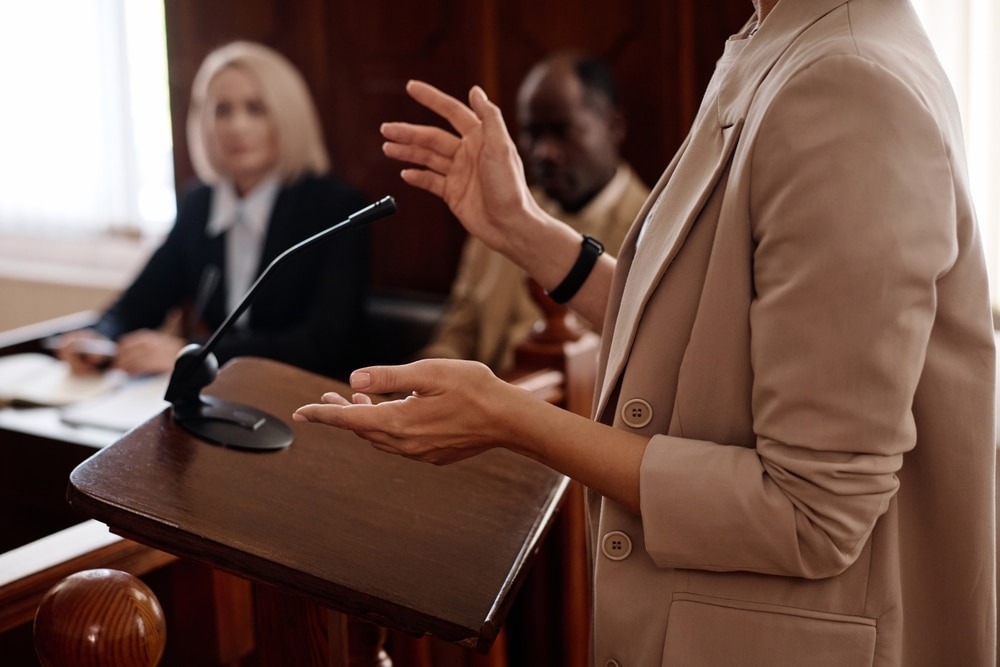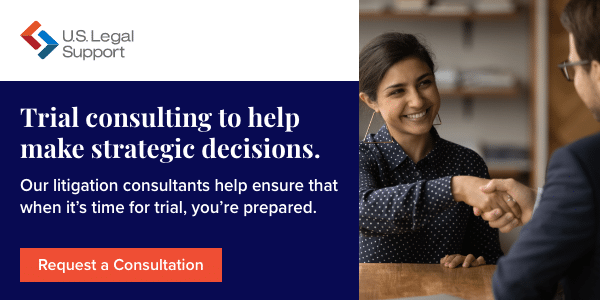Preparing Different Types of Witnesses

Determination, honesty, vulnerability, grief—the impact of witness testimony can be greater than the facts it uncovers. But jurors need to understand testimonies, find witnesses trustworthy, and believe their stories, making witness preparation a critical aspect of overall trial prep.
Witness prep doesn’t fit into a simple template, nor does it need to be built from scratch for every individual. The first step toward organizing your plan is clarifying what’s needed for different types of witnesses, from expert to bystander. This is especially important when factoring in considerations for hybrid court cases, where witnesses may testify both in-person and remotely, requiring tailored preparation for each setting.
Classifying witness types provides the initial framework for developing effective testimony preparation techniques for each.
Understanding the Main Types of Witnesses
Each witness is a unique character in your trial narrative, but there are four main types of witnesses to be aware of when developing your witness prep strategy. Understanding these distinctions helps lawyers assess which strategies to implement when preparing witnesses to testify.
Fact Witnesses
Witnesses of fact are individuals with firsthand knowledge of the facts introduced at trial. They may include individuals who observed criminal actions (a.k.a. eyewitnesses) or those who can offer testimony of what they personally know or have observed.
Federal Rule of Evidence 602, Need for Personal Knowledge, clarifies that witnesses must1:
- Have directly seen, heard, or otherwise experienced the relevant event or facts
- Exclude any testimony based on speculation or assumption
- Comply with hearsay limitations
Essentially, they need to recall knowledge clearly and confidently, without the appearance of bias or incompetence. This is critical because their testimony acts as direct evidence—if they aren’t believable, then juries and judges may end up excluding facts to which they testify.
(Note, while we refer to the Federal Rules of Evidence in this article, check on your jurisdiction’s rules on how witness evidence and treatment are governed.)
Expert Witnesses
Trial attorneys often leverage expert witnesses, who play a pivotal role in explaining complex matters with clarity and authority. Their testimony must be able to stand up to scrutiny in terms of both facts and scientific methodology.
Expert witnesses may be solicited to review data solely based on their demonstrated expertise, with no initial connection to the case. They may also be involved in the collection and interpretation of evidence (for instance, if they’re a forensic pathologist).
Under Federal Rule of Evidence 702, an expert witness must2:
- Have provable qualifications of knowledge, skill, experience, training, or education
- Offer testimony that will help determine a fact in issue or understand the evidence
- Base testimony on sufficient facts or data (i.e., be well-grounded and not speculative)
- Leverage reliable principles and methods (i.e., sound scientific or technical reasoning)
Judges are tasked with gatekeeping expert testimony to ensure it’s both relevant and reliable, including assessment of the methods and principles underlying an expert opinion.
Character Witnesses
Character witnesses offer personal insight into another individual’s traits or reputation to support the likelihood of the individual having committed or avoided an act in question.
There are significant limitations on how and when character witnesses can be used by either legal team, especially based on whether a trial is civil or criminal. In general, under the Federal Rules of Evidence, character witnesses can be used3,4:
- By criminal defendants to illustrate a pertinent trait of their own
- By criminal defendants to identify a pertinent trait of a victim
- To rebut previously introduced testimony
- To testify to the character of another witness after their truthfulness is questioned
In addition to testimony that supports a trial theory (e.g., whether an individual did or did not do something), character witnesses may be used to humanize and provide insight into a defendant’s challenges at both the trial and sentencing stages.
Hostile or Adverse Witnesses
While it’s simple to predict which witnesses—often from the opposition’s list—will be hostile to your case, attorneys can also encounter unexpected flips that require treating their own witness as hostile or adverse. Witnesses may display:
- Evasive or uncooperative responses
- Unexpected responses conflicting with witness preparation
- Contradictions or inconsistencies with prior testimony
These behaviors can be due to:
- Actual or perceived cost/benefit of a case outcome to the witness
- Personal relationship to a defendant or claimant
- Bias or partiality, either previously established or discovered during trial
- Animosity toward a private individual, business, or lawyer
Legal teams must be able to manage unpredictability on the stand and be prepared to designate witnesses as hostile when necessary. Doing so allows for a different set of rules, including the allowance of5:
- Leading questions
- Introduction of prior inconsistent statements
- Cross-examination of one’s own witness
Tailoring Your Prep Strategy to the Witness Type
It’s best to prepare your witnesses for depositions and trials based on what they need to know and practice. Clearly, there are overlapping instructions, but you can help your witnesses be at their most effective and leverage finite preparation time by aligning preparation strategies with types of witnesses.
Fact Witnesses
You rely on fact witnesses to offer critical “what, when, where, and who” facts that help build and defend your client’s case. To do that, focus on:
- Clarity – Offering accuracy and concise language throughout the testimony
- Consistency – Eliminating any divergences from deposition and earlier testimony
- Composure – Staying calm, professional, and respectful
- Conflicts – Addressing any concerns over self-incrimination
Fact witnesses are typically courtroom newbies, so you’ll also need to cover details such as:
- What impeachment means and how to avoid it
- Courtroom protocol and procedures
- Communication skills, including nonverbal
- How to mitigate public speaking fears
- Appropriate dress and self-presentation
- Practicalities, including schedule, parking, bathrooms, meeting technology, etc.
Additionally, explain that they shouldn’t bring notes with them, but rather familiarize themselves with their own prior testimony and statements (as well as documents that are critical to testimony) before showing up at trial. They can still request to view and read text as needed during examination, but being prepared supports the appearance of truthfulness, expertise, and respect for the court’s time.
Experts
To prepare expert witnesses, you’ll need a baseline of their overall trial experience, as well as specific knowledge of the pertinent jurisdiction and court location. If they’re new to courtrooms, cover the basics above (appearance, protocol, etc.) before moving on to the following:
- Streamlining technical language
- Developing and displaying useful demonstratives
- Understanding how their testimony fits into your trial argument
- Identifying predictable criticisms (to their expertise as well as the facts they present)
- Strengthening their resilience under cross-examination
Make sure your experts know when to be brief and when to elaborate. Help them understand the value of brevity combined with your ability to object versus when to offer more complete answers. For instance, opposing counsel may craft yes or no questions that support their argument but obscure a complete picture. Rather than a one-word answer, witnesses at trial may need to speak up with a clarifying answer beyond yes or no.
Character Witnesses
Since character witnesses don’t typically convey evidentiary facts, preparation may be considered less critical. However, it’s still essential to cover both the basics of the courtroom and the content of their testimony.
Since the state and projectability of emotions are at the forefront, make sure character witnesses are comfortable anticipating the procedure and personnel involved in the courtroom. Provide information on exactly what will occur, where, and by whom during the proceeding. This can extend to including a briefing on the opposing counsel, who may be present in the gallery, and any particularities of the scheduled judge around court etiquette or the like.
Next, focus on:
- Their ability to back up any specific acts or behaviors under cross
- Offering assistance to boost the impact of their tone and presence
- Clarifying what is relevant
Hostile Witnesses
Whether a witness is already established as hostile or flips during the trial, preparation needs will fall more on the attorney than on the witness. To that end, plan for the following:
- Be ready with impeachment tactics and materials
- Practice arguments and questioning to retain control regardless of hostile designation
- Consider objection timing to maximize impact
- Look for any hesitation or potential conflicts that may flip a formerly neutral witness
- Document potential questions or areas of inquiry for witnesses who turn hostile
Practical Techniques for Witness Prep
Witness preparation can take many forms, from simple reminders to sophisticated dry runs. Once you identify what’s needed for your case and specific witnesses, select the most relevant and effective preparation techniques, like:
- Mock trials in a simulated environment
- Role-play and mock examinations based on likely courtroom dynamics
- Using transcripts and recordings for feedback and refinement
- Preparing for opposing counsel strategies: direct, cross, and redirect
- Discussing privilege and what not to say on the stand
Final Thoughts: Confident Witnesses Strengthen Your Case
Well-prepared witnesses are key to positive case outcomes. By breaking down the types of witnesses in your trial, you can develop solid and successful preparation plans.
The next step for leading firms is to engage premier trial consultants for additional support. TrialQuest, the trial services division of U.S. Legal Support, provides witness preparation, voir dire, jury research and consulting, mock trials, trial graphics and demonstratives, and trial presentation and technology services. Our elite jury consultants, Ph.D. behavioral scientists, psychologists, and designers have supported more than 53,000 high-risk trials, arbitrations, and mediations across nearly all practice areas and jurisdictions.
Ready to learn more? Reach out today to discuss your witness preparation and other trial and legal support needs.
Sources:
- National Court Rules Committee Federal Rules of Evidence. Rule 602 – Need for Personal Knowledge. https://www.rulesofevidence.org/fre/article-vi/rule-602/
- National Court Rules Committee Federal Rules of Evidence. Rule 702 – Testimony by Expert Witnesses. https://www.rulesofevidence.org/fre/article-vii/rule-702/
- National Court Rules Committee Federal Rules of Evidence. Rule 404 – Character Evidence; Other Crimes, Wrongs or Acts. https://www.rulesofevidence.org/fre/article-iv/rule-404/
- National Court Rules Committee Federal Rules of Evidence. Rule 608 – A Witness’s Character for Truthfulness or Untruthfulness. https://www.rulesofevidence.org/fre/article-vi/rule-608/
Cornell Law School. Federal Rules of Evidence: Rule 611. Mode and Order of Examining Witnesses and Presenting Evidence. https://www.law.cornell.edu/rules/fre/rule_611

Editoral Policy
Content published on the U.S. Legal Support blog is reviewed by professionals in the legal and litigation support services field to help ensure accurate information. The information provided in this blog is for informational purposes only and should not be construed as legal advice for attorneys or clients.


